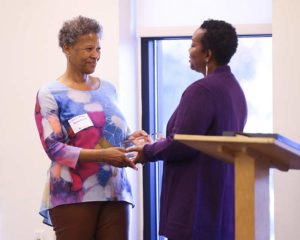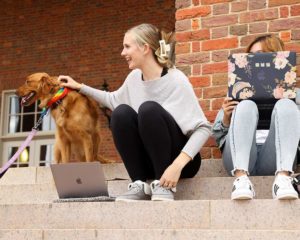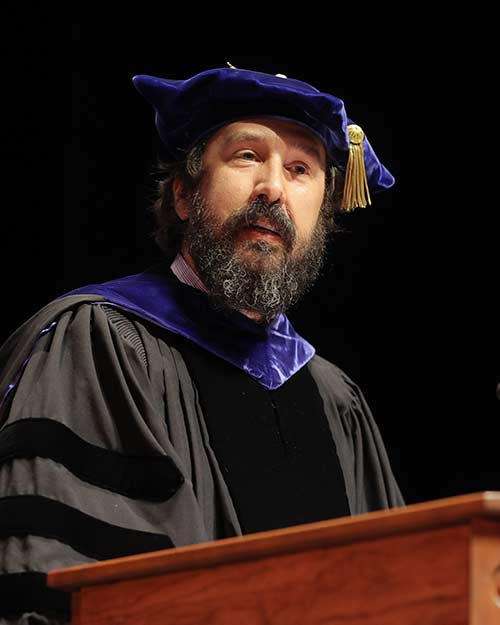INCLUSIVE EXCELLENCE
2021 International Student Orientation
One way Furman fosters belonging is by creating a sense of community at a critical transition time in a student’s pathway, their first year. This spring, the university broke ground on a comprehensive renovation of the South Housing complex that will include building a new residence hall and updating four others devoted to first-year students. This residential village will offer new personal, social and learning spaces for students to connect with faculty, staff and one another, setting students’ trajectories for success. The design will also provide abundant space for the Center for Inclusive Communities, which will move from the Trone Student Center, to grow initiatives and programs that promote student success through inclusion.
Like every year, the past year’s campus programming brought rich opportunities for students to develop their empathy, curiosity and understanding of diversity, equity and inclusion. One Cultural Life Program, “Breathing New Life into Old Treaties: Contemporary Enforcement of Native American Treaties,” examined the U.S. government’s legal interactions with Native American tribes. Another CLP offering was a yearlong series under the theme “Women and Gender in World History.” Students also explored historical sites in Birmingham, Montgomery and Selma, Alabama, during a visit to the Civil Rights Trail. In the spring, students attended presentations such as “Beyond ABCD: A Desi American Story,” “Creating Home on Both Sides of the Pacific Ocean: The Archeology of Old Chinatowns & New Villages” and “Voices of Africa,” in which African students presented on the distinctness of their homelands.
A May Experience course on the “Seeking Abraham” tour gave students a deeper awareness of Furman’s connection to slavery and the legacies of racism. The course was one recommendation of Furman’s Task Force on Slavery and Justice, which created a report and recommendations to tell a fuller, more accurate history of the university and to recognize the contributions of Black Americans to Furman’s founding and success. Among many other recommendations, the task force’s “Seeking Abraham” report called for renaming or placing contextual signage at campus sites.
In fall 2021, Furman conducted a campus climate assessment to measure the university’s progress in diversity, equity, inclusion and belonging and to support the university’s broader goal of inclusive excellence. Climate surveys help universities understand perceptions and perspectives of an academic organization and the degree to which students and employees feel a sense of engagement and belonging.
Anita Davis, vice president for diversity, equity, and inclusion at Trinity College, led the assessment, while the Higher Education Data Sharing Consortium administered the survey. Davis and her team also conducted focus groups, whose feedback was included in the data analysis. In April 2022, Davis and her colleague, Kelly Weeks of Rhodes College, returned to Furman and reported their findings to faculty, staff and students. The results of this assessment will inform ongoing and future efforts to make Furman more diverse, equitable and inclusive. Key preliminary findings of the assessment include:
• Hiring a more diverse faculty.
• A solid infrastructure of diversity, equity and inclusive initiatives in place and a core group of people committed to advancing them.
• Students are leading DEI efforts among students and faculty.
• Professional development opportunities for faculty and staff, including conversations such as “Foundations of Anti-Racism.”
• Increasing diversity among administration and staff.
• Increasing messaging from top administrators that DEI is a priority for all divisions.
• Improving a sense of belonging and safety for BIPOC and LGBTQ+ students.
• Creating a vice president-level chief diversity officer to develop a campus wide strategy to continue Furman’s advancement in DEI.
EXCELLENCE

Cherie Maiden, who was the Lois Aileen Coggins Professor of French, is recognized during the Black Alumni Council Reception and Awards ceremony during Homecoming 2021 after her retirement that year. When she began teaching at Furman in 1983, Maiden was one of the first two full-time Black professors at the university.
This past academic year was the inaugural year of the Black Alumni Council, comprised of 17 alumni representing more than 50 years of graduates. Programming included events for alumni, students, faculty and staff to gather and build community. A particular highlight was the council’s Black to Furman Welcome Weekend for students, faculty and staff. This will become an annual tradition.
The university also launched the Furman Black Faculty and Staff Association. It is intended to serve as an advocate and support group for the concerns of Black faculty, staff and students, while working to enhance their recruitment, retention and advancement. The group approved its bylaws in May and elected its first board in August. The association also:
• Provide a forum for addressing academic issues that affect Furman’s Black community.
• Improve the academic and work environment for Black faculty, administrators, staff and students and provide a networking and support system.
• Advise Furman’s leaders and community on their needs and concerns.
• Promote diversity, equity and inclusion as important components of employment and academic pursuits.
• Establish and maintain working relationships with university units, alumni, community groups, and Black faculty, administrators and staff at other local, regional and national institutions, and monitor and encourage diversity as an integral part of Furman’s mission.
The Student Diversity Council is the umbrella organization for identity-based groups on Furman’s campus that include but are not limited to worldviews formed by race, ethnicity, gender, national origin, abilities, sexual orientation and religion. The council promotes awareness of cultural diversity at Furman and in the Greenville community.
“We are thrilled about the experiences these colleagues bring to the table, the energies that they will infuse into our curricula, and the many positive impacts their work will have on our students’ pathways.”
The LGBTQ+ Affairs Subcommittee, meanwhile, hosted the first-ever LGBTQ+ alumni homecoming brunch with plans to make it an annual event. Members of the subcommittee also visited Elon and Wake Forest universities to gather information about their extensive resources for LGBTQ+ students in hopes of establishing some of those same offerings at Furman.

In fall 2021, Carson Kirby ’22 and Rosie Kim ’22 attend LGBTQIA+ Sextacular! at the Joseph Vaughn Plaza.
As always, the search processes to recruit faculty for the 2021-2022 academic year placed the highest priority on inclusive excellence. The dean of faculty, in collaboration with members of the President’s Diversity, Equity and Inclusion Committee, reviewed each position request, advertisement, outreach effort and vetting procedure. Departments that conducted hiring searches participated in inclusive-search workshops, and candidates who were invited to on-campus interviews met with faculty and staff to discuss potential contributions to Furman’s DEI goals.
The university’s new faculty came from a variety of institutions and contexts in which they had demonstrated a deep commitment to excellent teaching and an eagerness to partner with undergraduate students in mentoring and research. The 2021 faculty hiring class reflected many kinds of diversity, a richness that will benefit student learning and curricula, while giving students the powerful and necessary experience of seeing themselves and some of their own lived experiences reflected in their professors and mentors.
The year brought a slate of other important hires, including Franklin Ellis, the new director of the Center for Inclusive Communities; the creation of the Associate Dean for Diversity, Equity, and Inclusive Excellence position, for which Professor of Communication Studies Cynthia King was named; and other dedicated positions to support DEI in the Office of the Provost, Admissions and Student Life. The university also is undertaking a search for a new chief diversity officer and elevating the role to a vice president.
